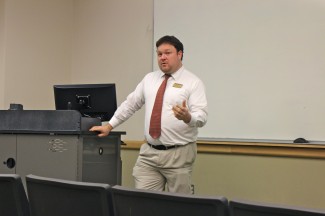Earning an education is a long and stressful process. The University of Idaho Career Center let students know at a presentation Wednesday that taking a year off after graduation could help students evaluate their future to make the “right” next step.
Eric Anderson and Matt Vaartstra, advisers at the UI Career Center, talked about the pros and cons of taking a gap year as part of the Vandal Career Development Series for fall 2014.

Genie Tran | Argonaut
Eric Anderson from the Career Center shared his experience and advices
about gap year and other alternate career options.
“It lets you get out there,” Vaartstra said. “(To) explore passions and values.”
“A gap year is any period of time spent doing something besides school or working on a career,” Vaartstra said. It can be taken after college, before graduate school or before starting a career — he said it could even be taken during college. It is an opportunity to explore new cultures and ideas while gaining experiences that some employers will be interested in, Vaartstra said.
The practice of taking a gap year is common in Europe, Anderson said, and is starting to become more common in the U.S. as well.
“What (you) want a gap year to be is meaningful,” Vaartstra said. “It can be that deep breath before jumping back into school.”
During that time a person could join the Peace Corps, work on a farm or teach English in another county, Anderson said. It is about what best fits what the individual wants to get out of the experience. He said a gap year could be taken anywhere like a hometown or in Moscow. One of the goals of a gap year is to jump out of an academic environment in order to take a break, Vaartstra said.
“I think of a gap year as an investment,” Anderson said.
With any investment, a gap year requires planning. It is important to start planning what to do during a gap year at least three months prior if the time will be spent in the U.S. and at least a year prior if the gap year will be spent abroad, Vaartstra said. If not planned out properly, he said a gap year can be stressful and expensive.
“You want to know what you want out of your life,” Vaartstra said. “(The gap year) will change you.”
There are numerous online resources and organizations to help plan gap years, Anderson said. There are also scammers who prey on students who are looking to take a gap year so it is important to verify the legitimacy of the organization, Anderson said.
Once the gap year is completed, the individual will have a different looking resume and while some think because it will have chronological gaps and appear to demonstrate a lack of commitment to any one thing, this is not the case, Vaartstra said. In order to make a gap year work to its full potential, one must learn how to talk about the experiences he or she had and Vaartstra said the UI Career Center would help students do just that.
“(We have a) once a Vandal, always a Vandal policy,” Vaartstra said.
The Career Center will work with alumni and current students to plan and make a gap year the best experience it can be.
Graham Perednia can be reached at [email protected]
